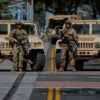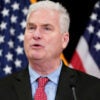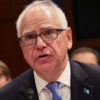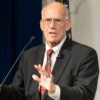It gets pretty boring to watch conservatives endlessly complain about a fawning press corps, and a biased media. Yes, a majority of the national media is left-leaning; even they will admit as much. Some journalists put political views aside, and do an excellent job of delivering the news. Others can’t bear to avoid political commentary. You can provide your own examples here.
But the problem conservatives have these days can’t just be prescribed to one individual journalist, but more to “group-think” deciding what is and isn’t a national story. And according to the Washington journalist group-think, the oil spill clean-up is definitely not a story. And according to the Washington journalist group-think, the president is doing an a-ok job responding the crisis. Both of these conclusions aren’t only wrong, but leave the citizens of the Gulf vulnerable to the long-term consequences of inaction.
Take today’s Rose Garden press conference. President Obama gave an update on the hopefully successful, yet temporary, capping of the oil well which is the source of all of the problems in the Gulf. It was only his third public mention of the crisis in over a month since he declared war on the environmental disaster in the Oval Office.
Obama smartly reminded everyone that the crisis is not over. What he did not do was address one single aspect of the ongoing clean-up, his reasoning for defying federal court orders to end the unnecessary drilling moratorium, or give a clear indication that he understands the human aspect to this crisis. He opened it up for questions, and the White House Pool Reporter for the day, Paula Cruickshank of CCH asked this question first:
“Did you feel the earthquake, Mr. President?”
See, early in the morning, Washington experienced a very minor earthquake that was the talk of Twitter but had no real world effects. It was simply an interesting gossip-item if anything. Knowing if its shake, rattles and rolls were felt in the White House would make for an interesting side note to the stories tomorrow, but really it wouldn’t deliver an ounce of news to anyone. (He didn’t feel it by the way, which demonstrates how awesome a spectacle it wasn’t) So why was it asked?
Because asking tough questions of the president, related to the oil spill, would expose the incompetent response this disaster has been met with, and the press corps simply doesn’t want to cover that story. Are they subconsciously trying to protect the president’s image? Maybe. Conspiracy theorists would add that it’s, in fact, conscious. Whatever the reasoning, it’s a disservice to their readers, listeners or viewers in the Gulf States.
The press corps did manage to ask him if he would return to the Gulf. He said he might, in the next couple weeks, maybe. The plans for his Maine vacation and tee times are set in stone. His return to, in his words, the “worst environmental disaster America has ever faced”? Tentative. A good follow-up question would have been: ‘Why are you not devoting public time or attention to this crisis?” Or how about:
1. Mr. President, why is your administration blocking permits to safely protect the waters and eco-system of southern Louisiana?
2. Mr. President, if the next hurricane hits in the next month, sweeping oil far inland and halting response efforts, will you regret the countless days of good weather your administration wasted dithering?
3. Mr. President, why is every available skimmer in the United States not in the Gulf of Mexico?
4. Mr. President, what offers of international assistance are you refusing, and why?
5. Mr. President, why are contracted workers only spending 20 minutes an hour working, and being stopped from working at night?
6. Mr. President, is there any federal court decision blocking your moratorium that you’ll abide by, and if not, why are you ignoring the judicial branch’s role?
7. Mr. President, why won’t you release the details of the contract you negotiated with BP for liability claims, and why is the claims process not transparent to state and local elected officials?
8. Mr. President, what is your reaction to offshore rigs leaving the Gulf of Mexico due to your moratorium? What do you have to say to the rig workers who have lost their jobs as a result of your decision?
9. Mr. President, will the Cap and Trade bill you are trying to sell as a result of this crisis do one thing to prevent a future crisis, and specifically, what is that?
10. Mr. President, do you regret any inaction on the part of the federal government?
Any of these ten questions would be honest journalistic oversight of a White House. None of them carry a political agenda. All of them would provide insight into the response. Yet none of them were asked, once, in the past three months.
This morning, the New York Times devoted a 41-word paragraph of a 1500-word A1 story to the fact that oil still remains in the Gulf. And in that paragraph, the federal responsibility for the clean-up efforts was not mentioned, nor scrutinized.
So yes, conservatives complain often about the media. But it is questions like “did you feel the earthquake, Mr. President?” which fuel this distrust, and cause us all to wonder if anyone is holding the president accountable for his incompetence.

































24 Replies to ““Did You Feel the Earthquake, Mr. President?” and 10 Questions He Wasn’t Asked”